Pressure washer buying guide
Pressure washer buying guide
Introduction
A pressure washer is a handy power tool that makes outdoor cleaning tasks quicker and easier compared with using a hose. But, with such a large range of pressure washers available, it can be hard to know what’s the best pressure washer to buy.
In this pressure washer buying guide, learn how a pressure washer works and what you can use it for. Discover the best pressure washer to use for different tasks. We’ll cover pressure washer types, features, accessories and things to consider when you’re looking to buy a pressure washer.
See our range of pressure washers here.
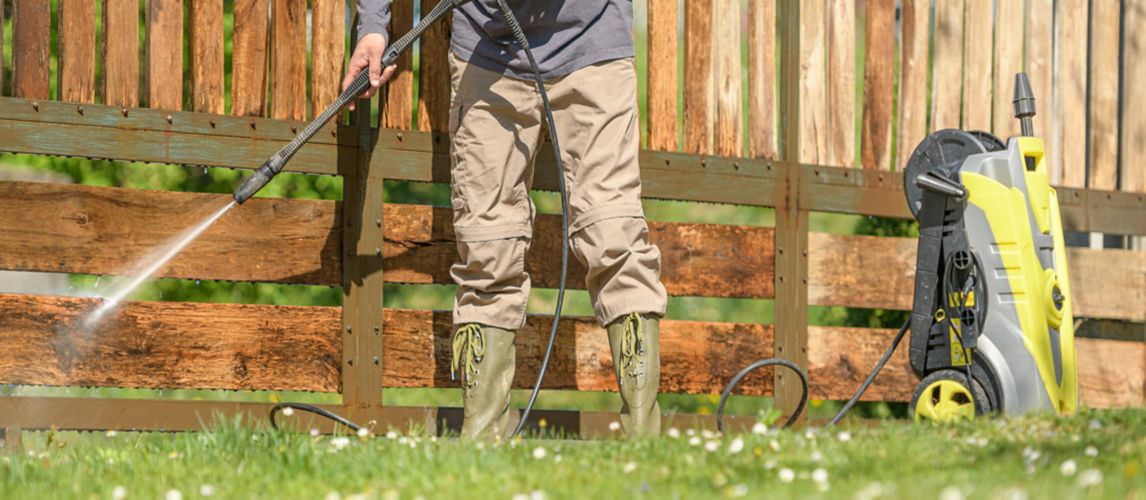
How Does a Pressure Washer Work?
The main parts of a pressure washer are the water inlet valve, water pump, motor, high-pressure hose, and the lance.
Water is fed into the water inlet valve, typically through a garden hose. Then the water pump, powered by the motor, draws in the water, accelerates it to high pressure, and pushes it out at high speed through the high-pressure hose and cleaning attachment. As the water travels fast, it can effortlessly blast away the dirt on a hard surface.
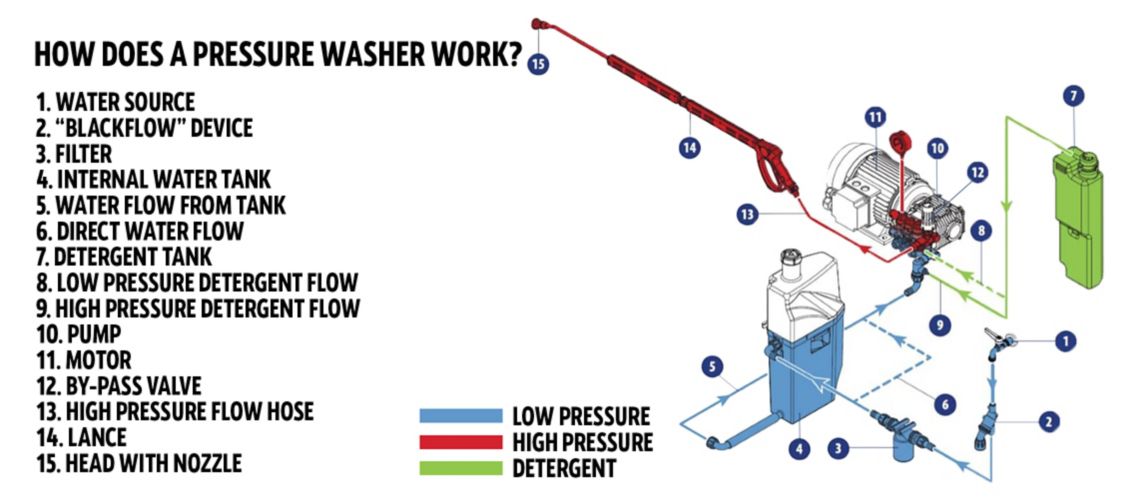
How much pressure do I need?
There are three different ways power and pressure are measured in pressure washers:
- The power of the motor: this is measured in watts (W) for an electric pressure washer and horsepower (Hp) if it’s petrol.
- The water pressure: this is measured in bar and can range from 90 bar to 280 bar, although lower bar options are available in some handheld options. The higher the bar, the more powerful the pressure washer.
- The maximum water flow rate: this is measured in litres per hour (Ltr/hr).
The water pressure and flow rate are the most important measurements to consider when deciding which pressure washer to buy. And picking the right ones for the job is essential; too little pressure will make the job take longer, and too much pressure could cause damage.
The water flow rate indicates the speed at which the pressure washer will rinse, so a high flow rate makes cleaning large surfaces quicker.
Pressure washer use can be split into light duty, medium duty, and heavy duty. And each use relates to the type of surface being cleaned and how dirty it is.
The table below shows which water pressure you need depending on the type of job you are doing:
|
Task |
Light Duty |
Medium Duty |
Heavy Duty |
|---|---|---|---|
|
Bar |
Up to 100 bar |
between 110-130 bar |
130+ bar |
|
Flow Rate |
Low flow rate (approx. 360 Ltr/hr) |
Medium flow rate (approx. 360-410 Ltr/hr) |
High flow rate (approx. 420+ Ltr/hr) |
|
Cars |
X |
X |
X |
|
Garden Funriture |
X |
|
|
|
Bikes |
X |
|
|
|
Decking |
X |
X |
|
|
Fences |
X |
X |
|
|
Block paving |
|
X |
|
|
Patio |
|
X |
X |
|
Concrete paving |
|
X |
X |
Most pressure washers allow you to vary the pressure. So, if you buy a pressure washer with enough bar for heavy duty tasks, you can use it for light duty tasks too.
Pressure Washer Uses
Pressure washers have many different uses for outdoor cleaning tasks, including:
- Cleaning different surfaces: pressure washers can clean most hard surfaces, including concrete, paving, swimming pool tiles, metal, plastic and wood.
- Removing dirt and grime: with the right pressure and detergent, pressure washers can clean many different types of dirt and grime. For example, light dust and dirt on cars and bikes. Green algae and moss on drives, decking and fencing. And more stubborn grime such as oil stains or chewing gum on concrete.
- For domestic use: use pressure washers around the home to clean cars, bikes, decking, fences, garden furniture, driveways and patios.
- For commercial use: heavy duty pressure washers are suitable for commercial use, such as professional driveway cleaning and cleaning vans and lorries.
- For industrial use: heavy duty pressure washers can clean large, heavily soiled areas such as car parks and building facades.
Best Pressure Washer
Pressure washers all have different attributes and features, so choosing the best pressure washer for your needs can be tricky.
In this section, we take a closer look at some of the different uses for pressure washers and explain what features you should look out for to best suit that particular task.
Best domestic and industrial pressure washers
The power and specifications of domestic and industrial use pressure washers are usually very different.
Domestic pressure washers are designed for infrequent, light to heavy duty cleaning jobs. The size of the motor tends to be small, and they have low to medium water pressure and water flow rates. They also have short hoses of around 3-10m. To choose the best domestic pressure washer for your needs, consider what power you need for the job in hand.
The best industrial pressure washers are more robust than domestic ones because they’re designed to be used frequently for very heavy duty cleaning. They have bigger motors, high water pressure and flow rates and long hoses of around 10-15m. They may also have telescopic handles and large rubber wheels to make them easier to manoeuvre over rough, uneven ground. Some electric industrial pressure washers also have long power cables. Or you can buy petrol pressure washers, which are often used in farming and construction sectors when there’s no access to an electricity supply.
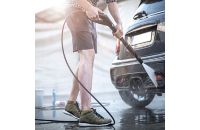
Best pressure washer for cars.
When it comes to cleaning cars, the pressure washer you need will depend on how dirty the car is likely to get. A 90-130 bar pressure washer will be fine for a standard car. But if you’re cleaning a large 4x4 that gets heavy-duty use, such as being taken off-road in muddy conditions, then a 130+ bar pressure washer is more suitable. Also, check the water flow rate. A high flow rate will allow you to rinse the car quickly, while a low flow rate will take longer.
Another thing to consider is the length of the hose. You’ll want a hose that’s at least 5m to allow you to get all the way around the car without moving the pressure washer. And there are also some hose attachments that are specifically designed for cleaning cars, such as brushes, detergents and angled nozzles. See the pressure washer accessories section for more information.
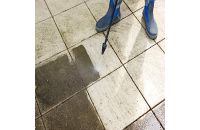
Best pressure washer for patio and concrete
The best pressure washer for concrete and patios is one designed for medium or heavy duty use. Which one you choose will depend on how dirty the patio or concrete is. For example, a pressure washer with 110-130 bar and a medium water flow rate is ideal for lightly soiled areas. But use a 130+ bar pressure washer with a medium or heavy flow rate for heavy grime, such as algae or oil stains.
If you’re cleaning a large area, look for a pressure washer with a long lance so you aren’t bending over and putting pressure on your back for long periods. A patio cleaner attachment is also recommended. It diffuses the spray of water to cover a larger area than a nozzle. It stops water from spraying everywhere, making the job quicker and less messy.
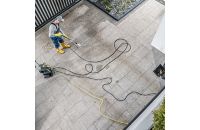
Best pressure washer for block paving
For personal domestic use, block paving is best cleaned with a 110-130 bar pressure washer with a medium flow rate.
However, if you provide a professional block paving cleaning service where the pressure washer is used daily, you’ll need a more robust, powerful machine, usually with 150+ bar water pressure and a high flow rate of at least 420 Ltr/hr.
A patio cleaning attachment is particularly recommended for block paving because it’s less likely to blast away the sand in the joints than using a standard nozzle. It disperses the water over a larger area and stops water from spraying everywhere, making the job quicker and less messy
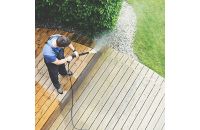
Best pressure washer for decks
The best pressure washer for decking will depend on the type of wood being cleaned and how dirty it is.
Softwood or lightly soiled hardwood decking should be cleaned with a pressure washer of up to 100 bar. Hardwood decking heavily soiled with algae can be cleaned with a 110-130 bar pressure washer.
We don’t recommend using a pressure washer over 130 bar on decking as it’s too powerful and could damage the wood.
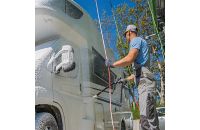
Best pressure washer for other uses
Pressure washers can be used to clean many other items around the home, such as bikes, garden furniture, caravans, guttering and garden toys. These tasks are classed as light duty and can be carried out using a pressure washer of up to 100 bar, with a low water flow rate.
When cleaning a high/tall item, such as guttering or a caravan, consider using an extension pole or telescopic handle that allows you to reach up high without using a ladder.
Types of Pressure Washer
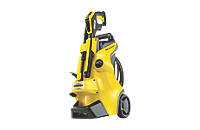
Pressure washers, also known as jet washers, power washers or power cleaners, are available in electric and petrol power.
Best electric pressure washer
Most pressure washers are powered by electricity, and they tend to be lighter and less noisy than petrol pressure washers. They’re better for the environment too.
You can buy electric pressure washers suitable for all types of uses, from light duty to heavy duty, and domestic home use to industrial use. Choosing the best electric pressure washer for your needs depends on what you’re looking to clean. See the ‘How much pressure do I need’ section further up the page for guidance.
Although industrial electric pressure washers are designed to be powerful, petrol pressure washers are even better for tough, professional jobs and prolonged use. See the best petrol pressure washers section below for more information.
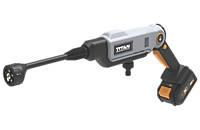
Cordless pressure washers
To use an electric pressure washer, you need to be near a power outlet. But there are cordless pressure washers available that are powered by a battery. They tend to have lower water pressure and flow rates, but they’re ideal for light domestic use where there’s no power supply. They can also draw water from a remote source, such as a bucket. So, for example, they’re perfect for washing your car or bike when you live in a flat. Or they’re a great lightweight, portable option to wash down mountain bikes or dirt bikes.
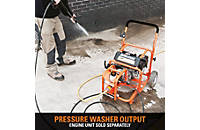
Best petrol pressure washers
The best petrol pressure washers have long telescopic handles and large rubber wheels for easy maneuvering. Long hoses let you cover large areas without having to move the pressure washer too often. And on-board accessory storage means you can have all the tools to hand as you work.
Top tip: how to maintain your petrol pressure washer following the E10 fuel change
In September 2021, E10 fuel replaced E5 fuel as the most common petrol type. This change can cause problems if your petrol pressure washer isn’t properly maintained. To avoid problems, don’t use fuel that’s more than 30 days old and don’t leave fuel in the tank if the pressure washer is going to be stored for 30 days or more.
Pressure Washer Motor Types
Pressure washers come with one of three motor types:
- Brush motor: These motors have brushes in constant contact with the rotating part of the motor. They cause friction which reduces efficiency and could lead to wear and tear.
- Universal motor: These motors are compact and run at high speeds. They tend to be louder and have a shorter life span than other motors.
- Induction motor: This motor is more complex than the others. It tends to be quieter, is more durable and has a long life span.
Another difference in these motors is that brush and universal motors are air-cooled while the induction motor is water-cooled. Air-cooled motors tend to be used in low-cost, entry-level pressure washers. They’re noisier and less efficient than water-cooled motors and they don’t last as long. In comparison, water-cooled motors are quieter and can last up to five times longer.
Although induction motors are the best, don’t be put off by brush and universal motors. They are used in pressure washers designed for light and medium duty use. So, if you stick to this and don’t use them for professional, frequent cleaning, they will work well.
Pressure Washer Features
Pressure washers come with various features, which makes them best suited to different types of cleaning tasks.
Some features to look out for are:
- Length of hose: lengths can vary from 2m to 15m. Consider how long a hose you’ll need. A 2m hose may be fine to clean garden furniture, but a longer one will be better for a large patio, for example.
- Lances: the lance is attached to the trigger gun/nozzle and can provide extra control over the water flow. For example, some can increase or decrease the water pressure without increasing water usage. The length of the lance is important too. A long lance, for example, will help you reach low places without having to bend your back.
- Handles and wheels: If you’re tackling large jobs or your pressure washer will be stored a long way from where you’re using it, look at the handles and wheels. Small, plastic wheels are fine for pulling pressure washers over flat, smooth surfaces. While large, rubber wheels are best for bumpy, uneven surfaces. When it comes to the handle, check the height. A low handle may cause back issues, while tall or telescopic handles will allow you to pull it without bending.
- Auto start/stop: pressure washers with this function use the trigger on the gun to turn the water flow off and on rather than using the main on/off switch. This saves water and detergent.
- Variable pressure: having a pressure washer with variable water pressure means you can use one machine for different tasks. You simply adjust the water pressure to suit the needs of the job.
- Storage and portability: all pressure washers will need to be moved around and stored, so it’s important to consider where yours will be kept. Some pressure washer features make them easier to move and store too, for example they may have wheels so you can pull them to their storage place. Some have a hose storage wheel, so the hose stays neat. And some have on-board accessory storage so everything can be stored neatly together.
- Detergent nozzles: some pressure washers come with a detergent nozzle that lets you attach a bottle of detergent so you can mix water and soap as you wash. This can save time on a task such as washing a car.
- Smart functionality: some pressure washers like Karcher come with smart functionality. This means they can be connected to and controlled by app on a smartphone via Bluetooth. Using your smartphone, you’re able to set and control the water pressure depending on your task. And it provides maintenance tips to help you take care of the machine.
Pressure Washer Storage
When your pressure washer isn’t in use, it’s essential that it’s stored away safely to prevent damage. Here are a few tips for safe storage:
- Ensure the machine is placed on an even surface
- Detach the lance and any accessories
- Remove the trigger gun from the hose
Pressure washer hose storage
The high pressure hose also requires careful storage to prevent damage:
- Rinse out any detergent to avoid clogging
- Don’t leave any water in the machine – if it freezes it will crack the pipes and damage the engine
- Don’t coil the hose too tightly as this can cause breakages
- Don’t drag the hose on the floor as this will cause it to fail prematurely
- Descale your pressure washer once per year if you live in a hard water area.
Pressure Washer Accessories
Pressure washers usually come with a standard spray nozzle for general cleaning jobs. But there are other specialist pressure washer accessories available to help you complete specific tasks with ease.
Specialist pressure washer accessories include:
- Drain and gutter cleaning kits
- Detergents, e.g., for patios, driveways, concrete, cars, stone and decking
- Hose extensions
- Car cleaning brushes
- Patio and hard surface cleaners
5 Things to Consider Before Buying a Pressure Washer
It’s always important to do your research before buying a pressure washer to ensure you’re getting the right product for your needs.
Here are five things to consider:
1. Is it for home or commercial use?
If you’re buying a pressure washer for personal use at home, it’s unlikely you’ll need a high powered one. A water pressure rating of up to 140 bar is enough for domestic use.[If you want a pressure washer for commercial use, i.e., it will be used daily, or for large scale jobs, then you’ll need a high powered, robust pressure washer of 150 bar or more. The best professional pressure washers also have an induction motor which has a long life span.
2. What are you trying to clean?
Cleaning items such as small cars, bikes and garden furniture is considered light duty use. A low water pressure rate (up to 100 bar) is fine for this. Wooden items, such as decking and fencing, should be cleaned with up to 130 bar water pressure. Then, hard surfaces, such as block paving, patios and concrete driveways, are classed as heavy duty use where the water pressure can be 130 bar or more.
3. How often will you be using the pressure washer?
Any type of pressure washer is fine for occasional use. But, if you’re planning to use it frequently (i.e., almost daily or several times a week for commercial jobs), then you’ll need a robust model with an induction motor. You could also consider getting a petrol pressure washer which is specifically designed for prolonged use.
4. What pressure do you need?
You may be looking for a pressure washer for a light duty cleaning task now, but it’s worth thinking about what other jobs you might need it for in future. If you buy one with a high-water pressure rate that can be varied, you’ll be able to use it for any light, medium and heavy duty tasks in future.
5. What about the water and power supply?
If there’s no power supply where you plan to use your pressure washer, purchase a petrol-powered model or a cordless, battery-powered model. When it comes to the water supply, you’ll need to be near an outside tap or have a very long garden hose. Alternatively, some pressure washers can draw water from other containers, such as a water butt or bucket, with the help of a suction hose.
